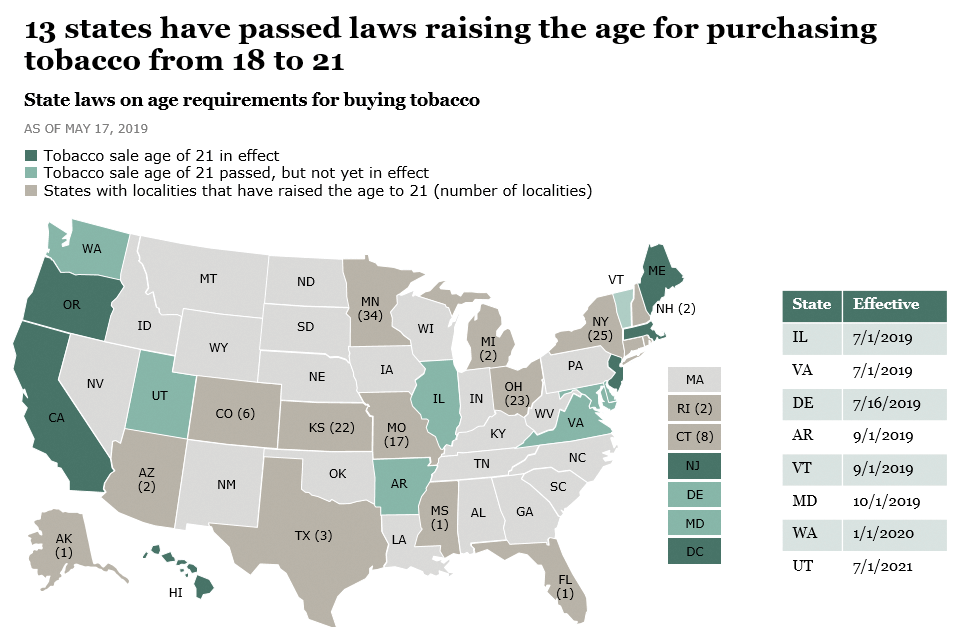I, surgeon general of the United States Public Health Service, VADM Jerome Adams, am emphasizing the importance of protecting our children from a lifetime of nicotine addiction and associated health risks by immediately addressing the epidemic of youth e-cigarette use. The recent surge in e-cigarette use among youth, which has been fueled by new types of e-cigarettes that have recently entered the market, is a cause for great concern. We must take action now to protect the health of our nation’s young people.
America’s love affair with tobacco has a long and sordid history. As automated machines ushered in a new age of modernization in the early 20th century, cigarettes were readily available as never before. Although some in the temperance movement believed tobacco products were the gateway to alcohol and drug abuse, by the 1930s and 1940s, physicians were touting cigarettes as almost a healing treatment that calmed the nerves and desensitized the body with positive effects.
The Dangers Emerge
But when U.S. Surgeon General Luther L. Terry, MD, issued a landmark report in 1964, a concerted effort began to report the links between tobacco and certain cancers. That public health campaign shifted the perspective about the use of tobacco products and started to reverse 100 years of promotion and aggressive advertising of the benefits of smoking. The Surgeon General’s Advisory Committee on Smoking and Health provided formal recommendations, and later the landmark Federal Cigarette Labeling and Advertising Act and the Public Health Cigarette Smoking Act of 1969 were passed to raise awareness and limit tobacco’s impact.
Tobacco Executives Deny Concerns
Subsequent surgeon general reports on smoking and additional research into the connections between tobacco and cancer and other diseases solidified the health community’s commitment to smoking cessation. By the 1990s, states had passed legislation requiring people to be at least 18 years old to purchase tobacco products, federal courts ruled that the government could regulate tobacco as a drug, and lawsuits were settled against Big Tobacco for billions of dollars. And still in 1994, tobacco company executives stood before a U.S. House of Representatives committee and stated that they did not believe nicotine was addictive. Finally, in 1998 those chief executive officers admitted that nicotine did in fact have addictive qualities, tobacco companies were aware of it, and they marketed the products regardless. A real corner had been turned.
Policymakers Respond
In the 2000s, forceful bipartisan legislation shifted with bills like the Family Smoking Prevention and Tobacco Control Act, which gave the U.S. Food and Drug Administration the authority to regulate the manufacture, distribution, and marketing of tobacco products. Much of the intent was to restrict minors’ access to and use of tobacco products, in hopes of limiting new smokers from beginning a lifetime habit that they would be unable to break. Raising the public’s consciousness about the adverse effects of smoking worked: 2018’s smoking rates were the lowest since 1965.
The Advent of Vaping
But then technology caught up with tobacco. New and inventive mechanisms, including vaping instruments and flavorings that masked traditional odors, became particularly appealing to youth. According the National Institute on Drug Abuse, “In addition to the unknown health effects, early evidence suggests that e-cigarette use may serve as an introductory product for preteens and teens who then go on to use other tobacco products, including cigarettes, which are known to cause disease and premature death.”
In May 2019, a federal judge ruled that FDA had been derelict in its oversight by allowing review of e-cigarettes and similar products to be extended until 2022. Although outgoing FDA Commissioner Scott Gottlieb had pulled that date back to 2021, the court ruled that the agency must review the products immediately and that neglecting to do so is tantamount to condoning the youth smoking epidemic.
Where We Are Now
In the coming weeks, the agency will comply with the federal order and submit an outline as to how to expedite the review process, confront the growing use of underage smoking, and restrict new forms of tobacco. Public sentiment, the legal system, and the regulatory authority are against the new industry, but advocates will still work diligently to stop Big Tobacco from attempting to create new products to entice consumption.
Listen to episode 55 of the ONS Podcast to get an inside conversation about the latest information and advocacy on this important topic.







